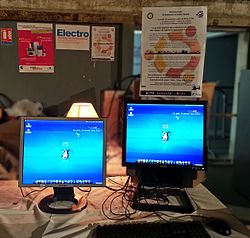Emmabuntüs
Emmabuntüs is a Linux distribution derived from Ubuntu/Debian[3] and designed to facilitate the repacking of computers donated to humanitarian organizations[4] like the Emmaüs Communities.[5][6][7][8][9]
 | |
 | |
| Developer | Collectif Emmabuntüs[1] |
|---|---|
| OS family | Unix-like |
| Working state | Current |
| Source model | Open source |
| Initial release | 29 March 2011 |
| Repository |
|
| Available in | Multilingual[2] |
| Update method | APT |
| Package manager | dpkg (Synaptic) |
| Platforms | i386, AMD64 |
| Userland | GNU Core Utilities |
| Default user interface | Xfce |
| License | Free software licenses (mainly GPL) |
| Official website | emmabuntus |
The name Emmabuntüs is a portmanteau of Emmaüs and Ubuntu.
Features
Emmabuntüs can be installed, in its entirety, without an Internet connection as all of the required packages are included within the disk image. The disk image includes packages for multiple languages and also optional non-free codecs that the user can choose whether to install or not.[10]
Emmabuntüs was developed to function correctly on 10 years old computers, which were previously running Windows XP or more up-to-date Windows versions, and equipped with a minimum of 1 Gigabyte of RAM for the 32 bits versions.[11] This allows associations like YovoTogo & JUMP Lab'Orione to recycle computers in order to equip high schools in Togo,[12] or the Emmabuntüs collective to equip kindergarten and elementary schools in the Paris area.[13]
Computer room at Nano High School, Savanes Region in northern Togo
Desktop environment
The desktop environment are Xfce and LXQt[14] with Cairo-Dock.
extensions included in the Firefox browser - Emmabuntüs DE 3
Kiwix offline wiki reader - Emmabuntüs DE 3 (Debian Edition)
Applications
Multiple applications are installed that perform the same task in order to provide a choice for each user that uses the system. Emmanuntüs also includes educational software like Gcompris, TuxPaint, TuxMath, TuxType, Scratch, etc. It also contains Kiwix, an off-line Wikipedia reader allowing Emmabuntüs to become an self-contained (without Internet access) Free Culture Server, including Wikis like Vikidia, or books in the ePub format.[15]
Emmabuntüs Media
Changing the profile of the dock
Non-free codecs installation
Extensions included in the Firefox browser
Screenshot of the LXDE environment
Related pages
References
- ↑ « Interview with Patrick d'Emmabuntüs: Emmabuntüs is more than a Linux distribution », Linux notes from DarkDuck, retrieved 2013-09-24.
- ↑ « Emmabuntüs Tutorials», Developpez.com.
- ↑ « Review: Emmabuntüs DE2 -Stretch 1.0 », Full Circle Magazine, retrieved 2018-01-26.
- ↑ « Interview: Emmabuntus, A Distro for All Seasons », Linux-Format, retrieved 2016-10.
- ↑ « Kompakter-Allrounder-fuer-aeltere-Computer », Linux Community Deutsch, retrieved 2013-06-10.
- ↑ Emmabuntus 2 – The French Revolution, Everyday Linux User
- ↑ Emmabuntüs – A Distro Tailor-made For Refurbished Computers, Make Tech Easier
- ↑ "Emmabuntüs: Schlanker Desktop mit vielen Anwendungen | c't Magazin". Archived from the original on 2018-07-01. Retrieved 2018-07-01.
- ↑ Emmabuntüs 2 (12.04) - LinuxFr.org
- ↑ « Features Emmabuntüs DE4 », Emmabuntüs Collective, retrieved 2022-03-06.
- ↑ « Hardware requirements », Emmabuntüs Collective, retrieved 2022-03-06.
- ↑ « Usage of Emmabuntüs in Togo by YovoTogo & JUMP Lab'Orione », Wikimedia Commons, retrieved 2018-03-03.
- ↑ « Emmabuntüs at school », Wikimedia Commons, retrieved 2016-10-05.
- ↑ « Use the LXQt desktop environment », Collectif Emmabuntüs on Emmabuntus.org, retrieved 2022-03-06
- ↑ « Emmabuntüs Debian Edition Libre Culture server », Collectif Emmabuntüs & Yves Saboret, retrieved 2016-12-15.
Other websites
| Wikimedia Commons has media related to Lua error in Module:Commons_link at line 62: attempt to index field 'wikibase' (a nil value).. |
- https://emmabuntus.org/ - Emmabuntüs Homepage
- Emmabuntüs at DistroWatch










